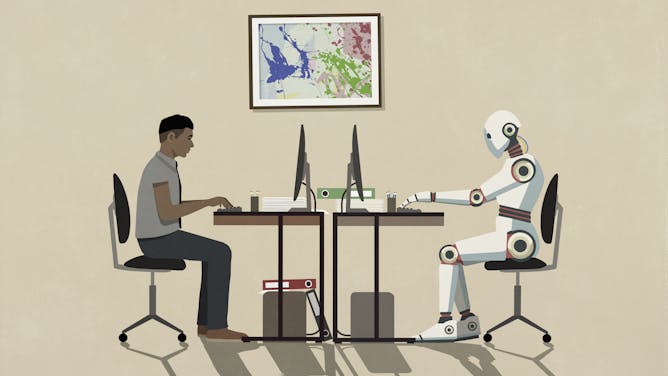|
Top headlines
Lead story
Ask anyone on the job market right now and they’ll tell you that it’s tough out there. Hiring has slowed to a crawl across industries, earning the moment a nickname: “the Great Freeze.” Even when companies are hiring, a gloomy question hangs over many interviews: Will artificial intelligence transform this job – or take it?
That’s why I was excited when Murugan Anandarajan at Drexel University reached out with new data from several hundred companies on this very issue. Over the summer, he and his colleagues conducted two national surveys to find out how businesses are using AI, and how they view job candidates who use it too.
The results reveal a clear tension. Companies want workers who understand AI, yet few know how to evaluate those skills. Anandarajan explains why knowing where the gap lies – and developing what he calls “digital bilingualism” – could be the key to staying indispensable in the age of AI.
[ Understand what’s going on in Washington and around the world. Get our Politics Weekly newsletter. ]
|

Success in the age of AI may depend less on technical skills and more on human judgment, adaptability and trust.
Malte Mueller/Getty Images
Murugan Anandarajan, Drexel University
Two surveys of hundreds of companies shed new light on what employers want.
|
Environment + Energy
|
-
Rachelle Wilson Tollemar, University of Wisconsin-Madison
While the rest of nature rises and slumbers to lunar and solar cycles, humans work and sleep to the resetting of their artificial clocks.
|
|
Politics + Society
|
-
Rahim Kurwa, University of Illinois Chicago
Anti-immigrant housing policies have been cast as a way for citizens to access more housing, but they fail to prevent the shortages driving the crises.
|
|
Science + Technology
|
-
Shelley Mitchell, Oklahoma State University
US farmers grow over 1 billion pounds of pumpkin each year.
-
Paul C. Sereno, University of Chicago
A clay layer one-hundredth of an inch thick preserves the fleshy details of dinosaurs buried suddenly in east-central Wyoming.
-
Guowei (Wayne) Tu, University of Michigan; Evgueni Filipov, University of Michigan
3D woven baskets are geometrically sophisticated, with some incredible properties that engineers can use to design materials and technology.
|
|
Education
|
-
Stanley S. Litow, Columbia University
A recent survey shows a dramatic drop in people who consider a college degree to be very important from 2010 to this year.
|
|
Economy + Business
|
-
Joshua Stillwagon, Babson College
The push to slash rates, despite what Trump considers a ‘hot’ economy, underscores why it’s important the Fed relies on data – and not the wishes of politicians – when making decisions about monetary policy.
|
|
Arts + Culture
|
-
Penelope Geng, Macalester College
Artists often turn to the supernatural to reflect on and speak to the anxieties brought about by social, religious and political upheaval.
|
|